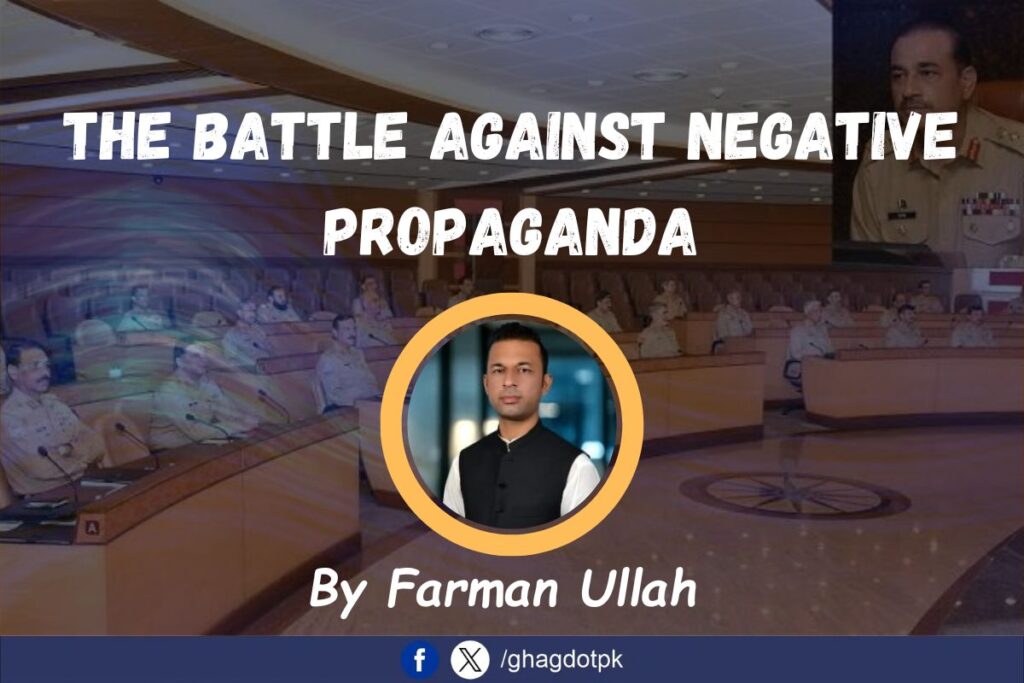By Farman Ullah
The recent Formation Commanders’ Conference has once again brought to the forefront the complex dynamics of the country’s security landscape. The conference, attended by senior military leaders, is one of the most crucial gatherings where matters of national security, defense strategies, and operational readiness are discussed. However, beyond the tactical and operational elements, the meeting also highlighted a pressing issue that has increasingly impacted Pakistan’s stability: the spread of negative propaganda against the military and the state.
Overview of the Formation Commanders’ Conference
The Formation Commanders’ Conference is a high-level strategic meeting convened by Pakistan’s military leadership, typically involving senior officers from different branches of the armed forces. This conference serves as a platform for evaluating the security environment, reviewing defense operations, and formulating future defense strategies.
Held periodically, the conference examines critical issues such as internal security challenges, border tensions, counterterrorism operations, and the status of military preparedness. The recent conference, however, also shed light on a more insidious threat—one that has gained significant momentum in recent years: negative propaganda aimed at discrediting the military and undermining national cohesion.
The Role of Propaganda in Pakistan’s Security Landscape
Negative propaganda, especially in the age of digital media and social networks, has proven to be one of the most potent tools employed by hostile forces to destabilize countries. In the case of Pakistan, the military has frequently found itself the subject of misinformation campaigns, many of which seek to erode public trust in the armed forces and weaken the public’s support for the state.
This phenomenon is not just limited to external enemies but also encompasses domestic elements seeking to exploit political divides, dissatisfaction with governance, or regional grievances. Some analysts argue that the spread of negative propaganda against Pakistan’s military is part of a broader geopolitical strategy aimed at diminishing Pakistan’s strategic importance in the region.
A Unified Response to Negative Propaganda
The military leadership has consistently rejected attempts to tarnish the image of the armed forces. The Formation Commanders’ Conference reiterated this stance, emphasizing the need for a unified response to negative narratives. The conference acknowledged that while freedom of speech and expression is a fundamental right, the spread of falsehoods and deliberate disinformation constitutes a direct threat to national security.
The military spokespersons have frequently pointed out that the growing number of media outlets and online platforms has amplified negative coverage. However, they have also stressed the importance of countering this with truth, and transparency, and by highlighting the real contributions of the military to Pakistan’s security.
General Asim Munir, the Chief of Army Staff, addressed the conference by emphasizing the importance of public trust in the military. He stated that the military is the backbone of Pakistan’s defense and must remain united in the face of any external or internal challenges. The army leadership expressed its commitment to maintaining the military’s honor and its role in safeguarding Pakistan’s sovereignty.
The Impact of Negative Propaganda on Public Perception
Negative propaganda has not only undermined the military’s reputation but also has a broader effect on public perception. The general public’s trust in the armed forces is essential for national cohesion, especially in a country that has faced myriad challenges ranging from terrorism to political instability.
In recent years, surveys and media reports have pointed out a visible shift in public attitudes. The deliberate spread of disinformation, fueled by both domestic and foreign actors, has clouded the true narrative. A segment of the population, particularly among the youth, has become more skeptical of the military’s role in the political and strategic affairs of the country.
This growing skepticism is often exacerbated by the rise of social media influencers and political parties that use platforms such as Twitter, Facebook, and YouTube to disseminate misinformation. These platforms allow for the rapid spread of unfounded allegations, which are sometimes based on fabricated news and half-truths.
Strategic Countermeasures and Media Collaboration
To combat this challenge, the military has increasingly turned to digital media and public relations strategies. At the Formation Commanders’ Conference, the need for better collaboration with the media was emphasized as a countermeasure to propaganda. The military has also initiated efforts to engage with independent journalists and media outlets, encouraging responsible reporting and debunking false claims through timely responses.
According to different reports, senior military officials have started engaging in regular media briefings to provide accurate information and clarify the military’s position on various national security issues. They are also working to build relationships with media stakeholders to ensure that the public receives factual and comprehensive news regarding military operations and the security situation.
Moreover, the Pakistan Army has increasingly utilized its media wing, the Inter-Services Public Relations (ISPR), to issue regular updates, conduct press conferences, and hold seminars. These initiatives are meant to keep the public informed about the military’s efforts in maintaining national security, as well as in humanitarian work in conflict zones.
The Political Dimension of Negative Propaganda
In addition to external factors, the negative portrayal of the military also has a political dimension. Certain political parties and figures, often critical of the military’s influence in politics, have leveraged propaganda to further their agendas. In recent years, political rhetoric against the military has intensified, particularly during election seasons. This has contributed to the polarization of public opinion, with many perceiving the military as a force that undermines democratic processes.
The military’s response, as discussed at the Formation Commanders’ Conference, has been to focus on safeguarding Pakistan’s democracy while remaining apolitical. Despite accusations of interference in political affairs, the military leadership continues to emphasize that it is committed to the Constitution and the protection of the people, rather than engaging in political maneuvering.






